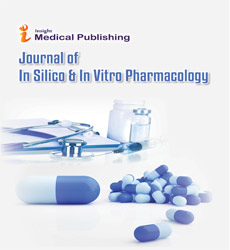Impact of serum Folate on Cancer cells
Andria Dsouza
Andria D’souza*
Managing Editor, Journal of In Silico and In Vitro Pharmacology, London, UK
- *Corresponding Author:
- Andria D’souza
Journal of In Silico and In Vitro Pharmacology
London
UK
E-mail: dousa387@hotmail.com
Received Date: March 01, 2021; Accepted Date: March 14, 2021; Published Date: March 21, 2021
Citation: D’souza A (2021) Impact of Serum Folate on Cancer Cells. In Silico In Vitro Pharmacol Vol.7 No.2:5.
Editorial Note
The significance of folate, a water-soluble B-vitamin, in the genesis and progression of cancer is still up for debate. The primary question is whether folic acid (a synthetic version of folate) and/or high folate intake from dietary and supplementary sources, as well as blood levels in general, can raise cancer risk. Although the exact form and magnitude of this supposed inverse relationship has been unclear and equivocal, a body of data from observational epidemiology and animal research suggests that folate deficiency raises the risk of some malignancies. As a result of this, various folic acid intervention trials in humans were conducted based on the notion that folic acid is safe and may be an optimal functional dietary component for cancer prevention, and premature suggestions to take a high dose of folic acid to prevent malignancies prevailed. The majority of randomised clinical trials have found that folic acid supplementation has no effect on cancer biomarkers (e.g., colon adenomatous polyp recurrence and cervical dysplasia regression) or has a slightly protective effect (e.g., bronchial metaplasia regression). Folic acid supplementation may have accelerated the progression of undiscovered pre-existing (pre) neoplastic lesions in the colorectal and prostate in these highly susceptible patients, according to one probable molecular explanation. Study, which appears in this edition of the Journal. In a prospective study, researchers looked at the relationship between folate and folic acid intake at diagnosis and recurrence of Non-Muscle-Invasive Bladder Cancer (NMIBC) in 619 individuals.
The question of whether folic acid supplementation can prevent or increase the development of cancer is still a hotly debated, complex, and unsolved one. Folic acid supplementation may prevent neoplastic beginning, but it may enhance the advancement of precancerous lesions already present, according to a body of evidence from animal and human research. Despite the lack of compelling evidence to the contrary, folic acid supplementation should be avoided in cancer patients and survivors, as well as in highly predisposed and vulnerable individuals at risk of cancer.
As a result of this, various folic acid intervention trials in humans were conducted based on the notion that folic acid is safe and may be an optimal functional dietary component for cancer prevention, and premature suggestions to take a high dose of folic acid to prevent malignancies prevailed. However, ground breaking research in animal models suggests that depending on the state of cell transformation at the time of intervention, folate may have multiple modulatory effects on cancer genesis and progression. Supplementing with folic acid can help to prevent the onset and progression of cancer, but it can also hasten the evolution of precancerous and cancerous conditions. As a result, the safety and unfavourable impacts of dramatically increased folate status in North America as a result of extensive folic acid supplement use must be continuously examined, with a particular focus on cancer incidence and mortality. As a result, the safety and unfavourable effects of the drastically enhanced folate status in North America as a result of widespread folic acid supplement use, with a special focus on cancer incidence and mortality, must be closely monitored.
Open Access Journals
- Aquaculture & Veterinary Science
- Chemistry & Chemical Sciences
- Clinical Sciences
- Engineering
- General Science
- Genetics & Molecular Biology
- Health Care & Nursing
- Immunology & Microbiology
- Materials Science
- Mathematics & Physics
- Medical Sciences
- Neurology & Psychiatry
- Oncology & Cancer Science
- Pharmaceutical Sciences
